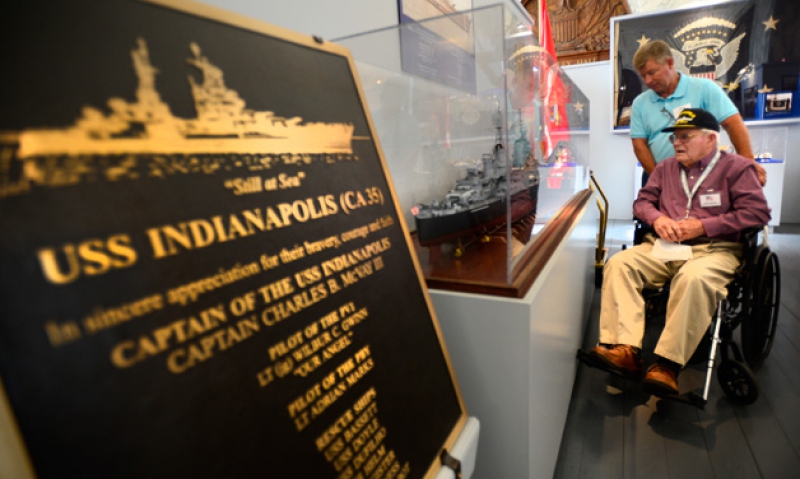
USS Indianapolis survivors recount sinking, rescue
 View Photo Gallery
View Photo Gallery
Fifteen of the 38 remaining survivors of the USS Indianapolis gathered in Indiana’s capital this past weekend in what could be their final reunion.
"We’re more like brothers; we’re closer than a lot of brothers. We always look forward to the reunions," said Loel Dede "L.D." Cox of Comanche, Texas.
The reunions generate attention to the World War II tragedy and help the survivors continue to heal. Even today, more than 68 years after their rescue, nightmares are common.
"Coming to these reunions, I get to see the people that I dream about," Cox said. "My dreams are not necessarily about being in the water. I’m in a big city, I don’t even know the town or city but I am supposed to go to the hotel for the night and I don’t know which hotel to go to. I begin to look around and all over the grounds. I can’t find my buddies but then I find one and I’m so happy. I turn around and look and he’s gone, then I have to start looking for another one. I suppose that means I’m back in the water again, looking for someone on my team."
The USS Indianapolis was attacked just after midnight July 30, 1945, by a Japanese submarine. The warship – which days earlier had secretly delivered the components for the first atomic bomb - sunk in 12 minutes, plunging its crew into the dark Pacific Ocean. Only 317 of the nearly 1,200 on board survived the sinking and the subsequent four-plus days in shark-infested water.
On Aug. 1, the survivors and their family members received a hero’s welcome as the USO Council of Indianapolis greeted them at the Indianapolis International Airport. During the next three days, they visited the Indiana War Museum, signed autographs, attended a special banquet and held a memorial for those lost at sea.
And, of course, they shared their stories.
Reacting to the torpedo attack. Jumping into oil-slicked water. Clinging to life jackets and makeshift rafts. Fighting off sharks and hallucinations. And, finally, being rescued.
During a question-and-answer session, survivor Dick Thelen of Michigan told the audience of several hundred people that thinking of his family is what helped him stay alive in the water. "My dad’s face got me through."
Edgar Harrell of Tennessee recalled spotting a raft and swimming over to it, against the advice of his friends. The good news? He found crates of potatoes. The bad news? "Rotten potatoes," Harrell said. "I peeled the skin back as far as I could to get some that wasn’t rotten and squeezed the potato to get a little piece."
In addition to the survivors, there are others who vow to keep the story of bravery and courage alive.
Kim Roller of Seattle has been sharing the USS Indianapolis story of survival at the group’s reunions, community events and schools for the past 10 years. One of her most memorable experiences occurred at a community college in Virginia where survivor Felton Outland spoke publicly for the first time.
"He was pretty emotional about doing this program. He had never done it before, hadn’t seen it, didn’t know what was going to happen on the stage," Roller said. "He still has a real hard time talking about it at all. And someone in the audience asked, ‘What is the one thing that you would say to my 14-year-old son?’
"Felton choked up and took the mic and said, ‘Never, ever give up.’ And that is their strongest message."
Brig. Gen. Stewart Goodwin is the executive director of the Indiana War Memorial Commission, which operates the Indiana War Museum. The museum hosts a special collection of artifacts from the USS Indianapolis survivors.
"It’s a natural fit for us because we are here to honor Hoosier veterans," Goodwin said. "I just figured it was a great place to put this. We just started putting it together and gathering artifacts. There was some concern by some of them (survivors) about whether this would last. I want them to know this is a permanent thing. Some of us will be gone but this will still be here and will tell their story."
Over the reunion weekend, the story was told by the survivors, their family members and naval historians to hundreds of supporters, friends and others interested in the tragedy. The stories all seem to reach the same conclusion: unimaginable heroism in an incomprehensible situation.
"Four-and-a-half days in the water, nothing to drink, they are seeing the sharks feed off of their shipmates," Goodwin said. "And when the sharks get hungry they are going to come back and pick one of them. I can’t even think of that. My brain can’t get wrapped around that … they are heroes. Rock stars, actors and sports stars are not heroes. These (survivors) are heroes."
